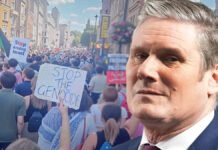United Nations human rights experts have strongly condemned a recent government-backed report into institutional racism, saying it offered “no evidence” to support its finding that the UK is not institutionally racist.
“In 2021, it is stunning to read a report on race and ethnicity that repackages racist tropes and stereotypes into fact, twisting data and misapplying statistics and studies into conclusory findings and ad hominem attacks on people of African descent,” the independent UN Working Group of Experts on People of African Descent said in a statement.
The UN group has called on the British government to “categorically reject” the findings of the Commission on Race and Ethnic Disparities report, which was commissioned in the aftermath of last year’s Black Lives Matter protests.
When the controversial report was released at the end of March, it was deemed a “whitewash” by racial equality advocates.
The report has several recommendations on closing racial disparities, but found no evidence of institutional racism and concluded the UK should act as a model for other “white-majority” countries.
Racism remains a problem, it says, but things like geography and socio-economic background had “more significant impact” on life chances than racism.
Policy experts at the time also pointed to glaring holes in its analysis. They said disparities — such as why ethnic minorities were disproportionately dying of Covid-19 as well as labor market discrimination — were explained away in the report by other factors, such as geography, living conditions and social income, while ignoring the role race played in determining those disparities.
Among other things, the Report blames single parents for poor outcomes, ignoring the racial disparities and the racialised nature of poor outcomes that exist despite an increased prevalence of single-parent families in every demographic. The Report’s conclusion that racism is either a product of the imagination of people of African descent or of discrete, individualised incidents ignores the pervasive role that the social construction of race was designed to play in society, particularly in normalising atrocity, in which the British state and institutions played a significant role.
The UN working group said that the report not only provided “no evidence” of its claim that the UK was not institutionally racist, but made “shocking misstatements and/or misunderstandings about data collection and mixed methods research,” and also attempted “to delegitimise data grounded in lived experience while also shifting the blame for the impacts of racism to the people most impacted by it.”
‘Reprehensible’
In the statement, the working group said racial disparities in the UK reflected “specific nodes of power and decision-making by employers, teachers, and others who dictate the opportunities and advantages available to people of African descent,” adding that “too often this decision-making reflects legacy mindsets of racial hierarchy.”
They also took aim at the report for attributing poor outcomes for some minority groups to family breakdown. “Therefore, the suggestion that family structure, rather than institutionalised and structural discriminatory practices are the central features of the Black experience is a tone-deaf attempt at rejecting the lived realities of people of African descent and other ethnic minorities in the UK,” the working group wrote.
Finally, the Report’s mythical representation of enslavement is an attempt to sanitise the history of the trade in enslaved Africans. This is a reprehensible, although not unfamiliar tactic, employed by many whose wealth came directly from the enslavement of others, ever since slavery was outlawed. Seeking to silence the brutal role of enslavers, the mind-numbing generational wealth they accrued, and the social capital and political influence they gained from exploiting black bodies is a deliberate attempt at historical misrepresentation. The Report’s sanitised version of history devalues the experiences, and deaths of millions of Africans who were violently uprooted, taken to the Americas where they were further exploited, brutalised and dehumanised.
It renders inconsequential, the fact, that for over 400 years, laws classified enslaved people in the Caribbean and their descendants as non-human, chattel, property, and real estate and social rhetoric and narrative evolved to rationalise, justify, and stabilise these injustices. They lost the basic human right to their legal identity and as such remained invisible in laws, legislation and policies. The cumulative result is racial inequality, structural invisibility, exclusion, and poverty. But more importantly, the Report fails to acknowledge how the legacies of enslavement continue to shape wealth disparities, social stratification and the experiences of people of African descent in Britain.
In response, a commission spokesperson stated that the UN had “grossly misrepresented the report’s findings, and appears to be a response to negative press coverage rather than the substance of its content.”
“The misleading claims they have made risk fostering division on the subject of race, rather than constructive discussion on the issues,” the commission’s spokesperson said, adding that they urge the British government to implement the report’s 24 recommendations.
The statement is issued by independent experts* of the Special Procedures of the United Nations Human Rights Council: Read here
Support Independent Journalism Today
Our unwavering dedication is to provide you with unbiased news, diverse perspectives, and insightful opinions. We're on a mission to ensure that those in positions of power are held accountable for their actions, but we can't do it alone. Labour Heartlands is primarily funded by me, Paul Knaggs, and by the generous contributions of readers like you. Your donations keep us going and help us uphold the principles of independent journalism. Join us in our quest for truth, transparency, and accountability – donate today and be a part of our mission!
Like everyone else, we're facing challenges, and we need your help to stay online and continue providing crucial journalism. Every contribution, no matter how small, goes a long way in helping us thrive. By becoming one of our donors, you become a vital part of our mission to uncover the truth and uphold the values of democracy.
While we maintain our independence from political affiliations, we stand united against corruption, injustice, and the erosion of free speech, truth, and democracy. We believe in the power of accurate information in a democracy, and we consider facts non-negotiable.
Your support, no matter the amount, can make a significant impact. Together, we can make a difference and continue our journey toward a more informed and just society.
Thank you for supporting Labour Heartlands












